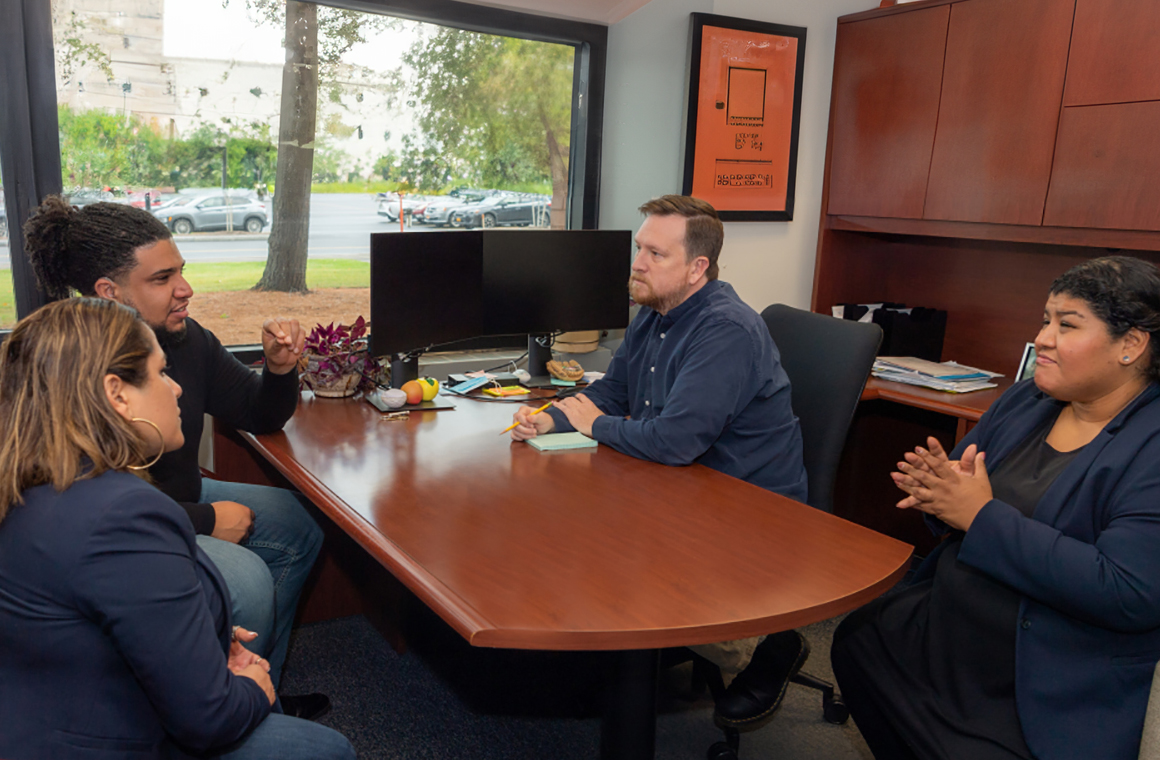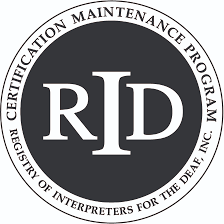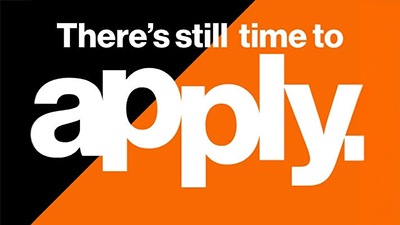Certificate in Trilingual Interpreting (Non-Credit)

Department of ASLIE
Certificate in Trilingual Interpreting
- RIT/
- ASLIE
Overview
The non-credit online Certificate in Trilingual Interpreting (CITRI) at NTID is a specialized program designed to enhance the skills of both current and aspiring trilingual interpreters. This rigorous program is uniquely structured to provide in-depth professional development in interpreting across American Sign Language (ASL), English, and Spanish, with an optional track for those fluent in Cantonese or Mandarin. This certificate aims to meet the growing demand for interpreters proficient in facilitating communication across these three languages, specifically in settings where linguistic and cultural competency is critical.
Drawing from a variety of sources, including work supported by the National Consortium of Interpreter Education Centers (2015) and the UGAM Interpreter Education Program in Puerto Rico (US Department of Education RSA CFDA #84.160D), CITRI delivers high-quality, research-informed instruction through experienced Instructors who are experts in trilingual interpreting. The curriculum is carefully structured to address both the linguistic and cultural complexities of trilingual communication, ensuring that participants are equipped to handle real-world interpreting challenges.
The CITRI program stands out by offering specialized professional development to help interpreters strengthen the skills essential for success in trilingual interpreting. Although it is not a certification preparation program, CITRI provides up to 15 Continuing Education Units (CEUs) from the Registry of Interpreters for the Deaf. These CEUs can be applied toward trilingual CEU requirements for certifications like the Texas BEI Trilingual Certification, as well as fulfilling requirements for maintaining or pursuing other professional credentials. This makes CITRI particularly valuable for interpreters aiming to meet trilingual CEU requirements or satisfy RID’s Power, Privilege, and Oppression requirement. NTID’s long-standing reputation for excellence in interpreter education, combined with its leadership in Deaf education, makes this program uniquely positioned to produce highly skilled and culturally competent trilingual interpreters.
 |
 |
ASLIE is an Approved RID CMP Sponsor for continuing education activities. This certificate is a Professional Studies (PS) program offering up to 15 CEUs at the Some Content Knowledge Level. (The program also includes some instructional material which counts toward RID CMP’s Power, Privilege, and Oppression requirement.) Should you need an accommodation, please contact Caleb Miller at clmnss@rit.edu. This certificate program upholds nondiscriminatory practices and encourages a learning environment which is free from bias and promotes mutual respect.
Goals
The Certificate in Trilingual Interpreting (CITRI) is dedicated to advancing the professional development of interpreters working in American Sign Language (ASL), English, and Spanish or Chinese. Our program is designed to:
- Enhance Interpreting Skills: Provide hands-on practice and targeted feedback to strengthen proficiency in bilingual and trilingual interpretation across ASL, English, and Spanish, with optional content for interpreters fluent in Cantonese or Mandarin.
- Expand Professional Knowledge: Deepen understanding of interpreting theory, techniques, and specialized vocabulary needed to excel in diverse trilingual settings, from educational to medical and community-based environments.
- Promote Cultural Competence: Cultivate awareness of the cultural nuances among Deaf, Latinx, and other language communities, fostering more inclusive and effective interpretation.
- Encourage Ethical Practice: Guide interpreters in developing a strong ethical framework, emphasizing professionalism, respect, and the interpreter’s role in bridging communication.
- Provide Continued Professional Development: Offer up to 15 Continuing Education Units (CEUs) that help interpreters meet ongoing certification and licensure requirements, supporting long-term career growth and recognition.
- Foster Community and Networking: Build connections among peers and mentors, fostering a collaborative learning environment and a supportive network of trilingual interpreting professionals.
- Incorporate Technology: Utilize an online, blended format that integrates multimedia resources and virtual practice opportunities, ensuring accessibility and engagement throughout the program.
Through these goals, CITRI empowers interpreters to meet the demands of an increasingly diverse and interconnected world, enhancing their impact within the communities they serve.
Outcomes
For Spanish Speaking Interpreters
After completing this program the interpreter will be able to:
- Describe at least three predominant attitudes hearing people have towards Deaf students in Spanish-speaking countries and the United States.
- Describe a general knowledge of basic services provided in Latin America and the Caribbean and contrast them from those provided in the U.S.
- Explain the main differences in communication styles between Mexican, Central American, South American, and Caribbean Spanish.
- Define their personal cultural values, beliefs, and perceptions.
- Understand and apply cultural values when interpreting for Latinx consumers and their families.
- Articulate how oppression, perceived and real, affects the interpreting process and intended outcomes.
- Demonstrate how to identify a Spanish-speaking hearing consumer’s country of origin and language use (regionalisms, form of address, etc.) to determine a target language.
- Describe types of oppression and how they manifest in Latinx communities.
- Understand that competency in one language pair does not automatically transfer to a different language pair.
- Identify professional organizations and other resources that support trilingual interpreters and bilingual spoken language interpreters.
- Demonstrate the ability to render a sight translation, and recognize how to do so, between Spanish and ASL, and English and Spanish.
- Demonstrate the ability to interpret consecutively, and recognize how to do so, between ASL, English, and Spanish.
- Demonstrate the ability to interpret simultaneously, and recognize how to do so, between ASL, English, and Spanish.
- Demonstrate creativity in adapting training resources designed for bilingual interpreters to aid and improve trilingual interpreting skills.
- Mobilize themselves and others to strengthen and foster growth in the specialty area of trilingual interpreting.
For Chinese Speaking Interpreters
After completing this program the interpreter will be able to:
- Describe at least three differences in social or cultural characteristics across the Chinese diaspora population.
- Describe at least three predominant attitudes hearing people in Chinese communities have towards deaf people.
- Identify at least three common Chinese dialects used in the U.S.
- Explain Chinese regional variations in mainland China, Taiwan, Macau, and Hong Kong.
- Understand and apply cultural values when interpreting for Chinese consumers and their families.
- Articulate how oppression and audism against deaf people in Chinese communities impact the interpreting process and intended outcomes.
- Describe ways to identify and mitigate imbalanced power dynamics between deaf and hearing consumers in a Chinese-speaking trilingual interpreting setting.
- Demonstrate how to identify a Chinese-speaking hearing consumer’s country of origin and language use to determine a target language.
- Identify at least three resources or tools for trilingual interpreters to improve their Chinese language skills.
- Demonstrate the ability to interpret consecutively, and recognize how to do so, between ASL, English, and a Chinese language.
- Demonstrate the ability to interpret simultaneously, and recognize how to do so, between ASL, English, and a Chinese language.
- Describe at least three settings Chinese-speaking trilingual interpreters encounter and explain the unique considerations for each setting.
Format
The program includes approximately 120 hours of instruction using an online blended format. Synchronous class sessions occur every other Tuesday from 7:00 PM – 9:00 PM (Eastern) in Zoom. The exact dates will be communicated to participants. Instructors provide office hours every Thursday evening from 6:00 – 8:00 PM (Eastern) as well as by appointment.
Class assignments include readings and reflective discussions, use of video materials and hands-on activities. Students should plan on scheduling an average of five hours per week for successful engagement in this program.
The program runs from September through May.
Admission Criteria
The following criteria will be used to select applicants to participate in this program. Qualified candidates will be interviewed before acceptance is offered.
- Proficient in reading and writing in both Spanish and English.
- Fluent in Spanish at the heritage speaker or near-heritage speaker level.
- Applicants must be currently working as sign language interpreters.
- Applicants must agree to complete the entire program, including attendance at all synchronous sessions. (No refunds will be given)
- Participants who wish to participate in the Chinese track (Cantonese or Mandarin) must have spoken fluency in a Chinese language; reading and writing proficiency will also be considered.
Equipment Needed
The following information explains the technical requirements for successful participation in NTID’s online, non-credit Certificate programs. It details the hardware and software requirements as well as the system requirements and Internet speed needed to engage with online classes successfully.
For an optimal learning experience in our online Certificate programs, students are required to have access to a working device that is less than 5 years old. The recommended devices are listed below:
- Desktop Computers with a built-in webcam or an external camera
- Laptops/MacBooks with a built-in webcam or an external camera
- Minimum of two monitors (strongly recommended for synchronous online courses)
Note: Chromebooks are not recommended for these programs due to potential compatibility issues with software and platforms like Zoom.
For the best experience with navigation, performance, accessibility, and compatibility on myCourses, it is required that all students use the latest version of a supported browser. The following browsers for the best use of myCourses are:
- Google Chrome (preferred) is highly recommended for its speed, performance, and compatibility with myCourses and GoReact.
- Firefox is another reliable option that you can use for myCourses.
- Microsoft Edge also works well with myCourses but it must be upgraded to the latest version.
Note: For Mac users, Safari browser is not recommended to use for MyCourses as it’s known to run into some functionality issues with MyCourses.
Your device must satisfy the minimum system requirements to ensure a successful online learning experience.
- Memory (RAM): Your computer must have at least 4 GB of RAM. However, 8 GB is highly recommended to ensure you can access all of the course materials, software, and resources faster, including video assignments without slowdowns.
- Operating System: The most recent versions of operating systems such as Windows 10 or 11, and Mac OS X (10.15 or above). Please note that Windows 10/11 S Mode is not supported.
- System Update: Your operating system must have the most recently released updates. These updates often resolve issues with web browsers and improve performances for software such as Zoom, MyCourses, and Microsoft Office.
A reliable high-speed internet connection with speeds of 20 Mbps or higher is recommended for online courses. This ensures smooth Zoom meetings, and quick access to all course materials, including video presentations. You can check your internet speed by going to www.speedtest.net or www.fast.com.
Coordinator and Instructor
Caleb Lopez Miller, M.S.
clmnss@rit.edu
 Caleb Lopez Miller is from Colombia, South America. Before he came to the United States, he graduated with a degree in finances and management and was an interpreter for the Deaf in Colombian Sign Language. Caleb has lived in the United States since 2001. He is a trilingual interpreter with a bachelor’s degree in American Sign Language interpretation and a master’s degree in health care interpretation. He has co-taught interpreting classes at the local college and also has presented workshops for sign language interpreters nationally and internationally.
Caleb Lopez Miller is from Colombia, South America. Before he came to the United States, he graduated with a degree in finances and management and was an interpreter for the Deaf in Colombian Sign Language. Caleb has lived in the United States since 2001. He is a trilingual interpreter with a bachelor’s degree in American Sign Language interpretation and a master’s degree in health care interpretation. He has co-taught interpreting classes at the local college and also has presented workshops for sign language interpreters nationally and internationally.
Caleb Lopez Miller es de Colombia, Sur America. Antes de venir a los Estados Unidos, Él se graduó como Administrador Financiero y trabajó como intérprete para los sordos en Lengua de señas Colombiana. Caleb vive en los Estados Unidos desde el año 2001. Él es un intérprete trilingüe con una carrera de Interpretación en Lengua de Señas Americana y una maestría en Interpretación en campos Médicos. Caleb ha enseñado clases de interpretación en el Colegio Comunitario local y ha presentado talleres para intérpretes en Lengua de Señas a nivel nacional e internacional.
Contact Us
Please direct questions to citri@rit.edu
This material is based on work supported by the National Consortium of Interpreter Education Centers (NCIEC). (2015). Interpreting in Spanish-Influenced Settings: A Curriculum Guide. National Consortium of Interpreter Education Centers. Retrieved from http://www.interpretereducation.org/wp-content/uploads/2015/05/Trilingual-Curriculum-Guide-2015-English.pdf
The NCIEC Toward Effective Practice: Interpreting in Spanish-Influenced Settings is licensed under a Creative Commons Attribution-NonCommercial-NoDerivs 3.0 License.
http://www.creativecommons.org/licenses/by-nc-nd/3.0/





